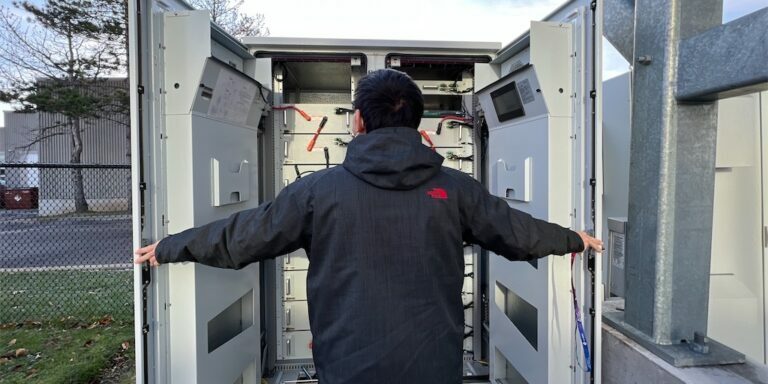5G Speeds to be Implemented in Battery Energy Storage to Promote Safety

Operating a battery energy storage comes with its own challenges; with safety and cost being the two most important factors. As highlighted in MaRS 5G Demo Day on October 15th, TROES is collaborating with ENCQOR to build up a 5G-based fast response Energy Management System to facilitate battery energy storage (BESS) operations to be safer and more robust.

How 5G Will Come Into Play
The whole system needs to be integrated by hardware and software, which includes battery energy storage system (BESS), wireless communication, and cloud-based management system. The 5G testbed will support TROES on the wireless communication part as 5G based router, 5G network environment and communication technology. With the testbed, the Battery Management System inside the Battery Energy Storage System will collect all the data and information through the sensors. After basic processing, the Battery Management System will send out the data through Modbus TCP protocol and wireless router to cloud based management system.
Limitations to 4G
Currently there are four limitations in the 4G network to achieve IoT applications, compared to a 5G network: accuracy, bandwidth, latency and security. As information accuracy is important for battery systems, the communication with 4G networks might not be able to achieve improved levels of accuracy, robustness and latency. Given the bandwidth of 4G network is limited, when a system is at a location that has high user volume, there might not be enough bandwidth resources to support the real-time communication on BESS which might lead to the commercial losses for system holders since the function is not well operated. In these scenarios, 5G network becomes a necessity to operate BESS as safely and cost-effectively as possible.
In addition, with faster response management system supported by the 5G technology, the delay will be within 10ms for a control cycle. Compared with the 50ms latency brought by the 4G network, the safeguard, like the fire suppression system, will react fast when there is an accidental alarm, which might lead to damage to the Energy Storage System or cause greater losses.
5G Will Help Save Costs
Furthermore, with real time control on energy storage systems, there is no need to have a local controller at the site, which will save cost for the whole system on local management system hardware – around $50/kWh. That could account for around 10% of the system cost, which will be saved. Since the battery energy storage system applications rely on feasibility studies, the cost is an important parameter in the viability of the related projects. With 10% of system cost decrease, battery energy storage systems become more financially attractive in the energy management strategies for applications in the commercial and industrial segments.
In conclusion, 5G offers an opportunity to make Battery Energy Storage Systems safer and more robust, and companies like TROES will adopt it to deliver their customers a better value proposition and help to transition towards a sustainable energy environment quicker.






